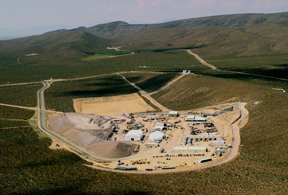Geotimes

Untitled Document

News Notes
Science policy
Yucca mountain e-mails reviewed
The content of e-mails sent by U.S. Geological Survey (USGS) employees that
raised concern over work at Yucca Mountain — site of the controversial
future nuclear waste repository in Nevada — should not affect the final
scientific assessments of the site, according to an analysis released Feb. 17.
 After decades of geological work assessing
Yucca Mountain for storing nuclear waste in Nevada, the official federal review
process for opening the site began in 2002. An accompanying examination by the
Department of Energy (DOE), as part of a required U.S. Nuclear Regulatory Com-mission
review, revealed a series of e-mails sent by USGS employees from 1998 to 2001
that threw the quality of their work into question — and even suggested
sabotage (see Geotimes, May 2005).
After more than a year of analysis, DOE’s Office of Civilian Radioactive
Waste Management has released its report on the potential impact of the e-mails.
After decades of geological work assessing
Yucca Mountain for storing nuclear waste in Nevada, the official federal review
process for opening the site began in 2002. An accompanying examination by the
Department of Energy (DOE), as part of a required U.S. Nuclear Regulatory Com-mission
review, revealed a series of e-mails sent by USGS employees from 1998 to 2001
that threw the quality of their work into question — and even suggested
sabotage (see Geotimes, May 2005).
After more than a year of analysis, DOE’s Office of Civilian Radioactive
Waste Management has released its report on the potential impact of the e-mails.
A recent report says that some controversial
e-mails sent between scientists working on water infiltration issues at Yucca
Mountain in Nevada should not affect the scientific assessment of the nuclear
waste repository planned there. Image is courtesy of DOE.
The DOE review shows that the science remains valid with regard to technical
issues on modeling and measuring net infiltration of water into the rocks at
the site. Although the DOE team did not rerun the USGS models, the report found
that the scientists’ results fell within the same range of other outside
researchers’ results in the region, despite statements that could be construed
that they fabricated data or other information pertinent to the work. The USGS
employees’ sentiments expressed in the e-mails, however, could still impact
several key problems DOE must address, to complete permitting for Yucca Mountain,
including scientific standards and the underlying causes of the employees’
attitudes toward the work.
“I think the e-mails had more to do with frustration at the scientists’
situation, versus any actual falsification of data results,” says Allison
Macfarlane, a geologist and policy specialist at MIT in Cambridge, Mass., who
has followed Yucca Mountain proceedings closely. “They were frustrated
with the lack of funding, lack of personnel and really short time frames that
the schedule demands.”
Still, Macfarlane also thinks that “there are issues with infiltration
rates that haven’t been answered yet,” which are outside the work
done by these particular geologists and “a bigger deal” than the e-mail
messages. Additional scientific problems include radiation standards and a nuclear
waste packaging redesign under way for the site.
The Department of the Interior continues its own investigation into the USGS
employees’ e-mails and their potential impact, expected to be completed
later this year. A USGS spokesperson said that the agency “is pleased that
the DOE recent finding supports the technical soundness of the infiltration
modeling work.”
Naomi Lubick
Links:
"Falsification alleged at Yucca Mountain,"
Geotimes, May 2005
Back to top
Untitled Document

 After decades of geological work assessing
Yucca Mountain for storing nuclear waste in Nevada, the official federal review
process for opening the site began in 2002. An accompanying examination by the
Department of Energy (DOE), as part of a required U.S. Nuclear Regulatory Com-mission
review, revealed a series of e-mails sent by USGS employees from 1998 to 2001
that threw the quality of their work into question — and even suggested
sabotage (see Geotimes, May 2005).
After more than a year of analysis, DOE’s Office of Civilian Radioactive
Waste Management has released its report on the potential impact of the e-mails.
After decades of geological work assessing
Yucca Mountain for storing nuclear waste in Nevada, the official federal review
process for opening the site began in 2002. An accompanying examination by the
Department of Energy (DOE), as part of a required U.S. Nuclear Regulatory Com-mission
review, revealed a series of e-mails sent by USGS employees from 1998 to 2001
that threw the quality of their work into question — and even suggested
sabotage (see Geotimes, May 2005).
After more than a year of analysis, DOE’s Office of Civilian Radioactive
Waste Management has released its report on the potential impact of the e-mails.

